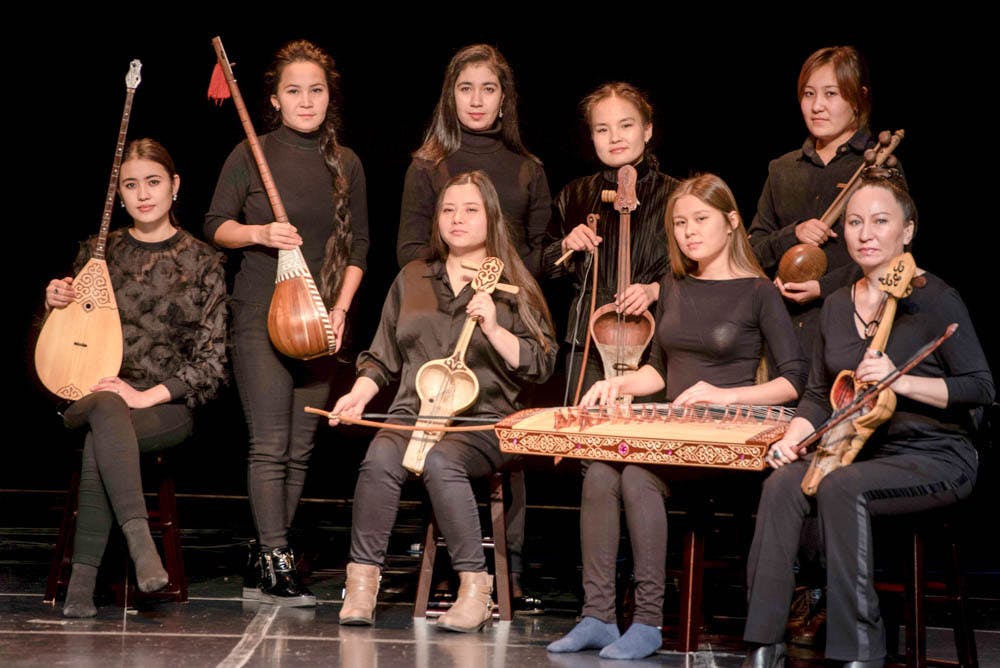Throughout last Wednesday night’s multimedia performance at the Rhode Island School of Design Auditorium entitled “Qyrq Qyz,” the composition of the stage shifted: The only set piece, a black mountain of fabric, was deconstructed and the performers rearranged positions and formations to the beat of the music. The blend of layered voices and instruments created a hypnotic effect, luring the audience, which ranged from young children to adults, into its story.
The project, presented by the Rhode Island nonprofit FirstWorks, the Aga Khan Music Initiative and the Provost’s Office at RISD, was the culmination of two to three years of research and collaboration between its director, Uzbek filmmaker Saodat Ismailova, and contemporary composer Dmitri Yanov-Yanovsky. Following the epic story of “Qyrq Qyz” — Turkic for forty girls — the performance told the centuries-old tale of 40 female warriors on a quest to protect their land, sounds and images of Central Asia.
“It’s about female empowerment,” Ismailova said, adding that she hopes this timely piece speaks to the audience in addition to the young female performers she directed. “I really hope that this project will give them a motivation and a belief that they should continue to develop their individuality and express themselves in their art,” as well as proving to the performers “that the woman has a capacity not only to devote herself to a family and children but also have her own individual voice,” Ismailova said.
Broken into four parts — earth, air, water and fire — the piece combined traditional music with contemporary film and movement. By creating a performative representation of the story, Ismailova was able to present the narrative to wider audiences, she said.
The film, which was silent during all but a few moments, was projected on a screen behind the performers. The bright colors and light often juxtaposed the darkened stage, the set piece and the simple, black costumes — which strayed from the traditional style and color of such a performance, Ismailova said. “It’s a rethinking of tradition,” she added.
Certain images — a blooming white flower, a white horse, stacked colorful mats — appeared throughout the performance, their symbolic meaning shifting as the tension in the plot grew, ultimately reaching their final form at the resolution.
While the telling of epic poems such as “Qyrq Qyz” remains a vibrant tradition in Central Asia, the last orator of “Qyrq Qyz” passed away in 2004, freezing the story and its tradition in its transcription from 1938, Ismailova explained. Inspired by the story, Ismailova challenged herself with determining what contemporary elements, such as “image, sound, movement, theatrical light and a composer,” could add to the performance, she said.
Theodore Levin, professor of music at Dartmouth, co-produced the project alongside the Aga Khan Music Initiative. “It’s a production of sublime beauty and … artistic imagination,” Levin said, adding that “‘Qyrq Qyz’ is at once ancient and very contemporary,” making it an example of how “the boundlessness of tradition (can) inspire contemporary artistic creativity.”
The Aga Khan Music Initiative is a cultural development program that works with local musicians in Central Asia and other regions of the world to “revitalize their musical traditions in the post-Soviet era and develop them further into contemporary languages of art,” Levin said. Ismailova had worked with the Initiative in the past, creating nine documentary films on the traditional music of Central Asia. This piece was inspired by a shorter work of film she created on the same topic, which led the Aga Khan Music Initiative to commission Ismailova to combine film with traditional music.
Levin, who has studied Central Asian music for 45 years, still considers himself a student, learning from the performers as he witnesses and discusses their tradition, techniques and “their own creative trajectories,” he explained. “For me it’s like really doing a kind of field work,” Levin said.
The performance was the first of three in the FirstWorks Frontier Series. FirstWorks is “dedicated to connecting art with audiences,” said Kathleen Pletcher, FirstWorks’ founder and executive artistic director. “Our whole idea is that we build our community, … (and) we build the fabric of Rhode Island, through world-class performing arts,” Pletcher added.
The series continued at the RISD Auditorium Sunday March 18, with a performance by Venezuelan singer Betsayda Machado. The final presentation of the series, a theatrical cinematic portrayal of a coming-of-age story, titled “Lula Del Ray,” will be presented at the Moses Brown School Woodman Family Community and Performance Center on April 7.





